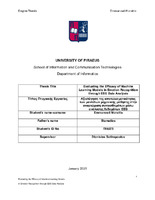Evaluating the efficacy of machine learning models in emotion recognition through EEG data analysis
Αξιολόγηση της αποτελεσματικότητας των μοντέλων μηχανικής μάθησης στην αναγνώριση συναισθημάτων μέσω ανάλυσης δεδομένων EEG

Bachelor Dissertation
Author
Moraitis, Emmanouil
Μωραΐτης, Εμμανουήλ
Date
2025-01View/
Keywords
Electroencephalography (EEG) ; Emotion recognition ; Machine learning ; Data classification ; Neural networksAbstract
Emotion recognition using EEG data is a field that stand between computing and
neuroscience. This study evaluates the performance of four machine learning models,
Support Vector Machine (SVM), Multi-Layer Perceptron (MLP) Classifier, Logistic
Regression, and Decision Tree Classifier classifying emotional states (NEGATIVE,
POSITIVE, NEUTRAL) based on EEG signals. Leveraging robust preprocessing
techniques and K-Fold cross-validation, we assessed each model's efficacy in handling
the complexity and high dimensionality of EEG data.
The results proved that SVM and MLP Classifier outperformed others with high
accuracy, with very little misclassification in all classes, while Logistic Regression and
Decision Tree Classifier, although interpretable, showed limitations in modelling subtle
emotional patterns and, especially, in class differentiation for overlapping classes. The
identified challenges are noise in EEG signals, model overfitting, and the trade-off
between model performance vs interpretability, which have been addressed to provide
insight into model suitability for real-world applications.
This study further develops emotion recognition technologies, establishing a baseline
for machine learning approaches applied to EEG data. It also opens paths to further
investigation.
By combining multiple models, fine-tuning the features they use, and taking changes in
emotions over time into account, we can make emotion recognition systems more
dependable and easier to apply. This will be especially helpful in fields like mental
health, adaptive interactions between people and computers, and personalized learning
programs.


